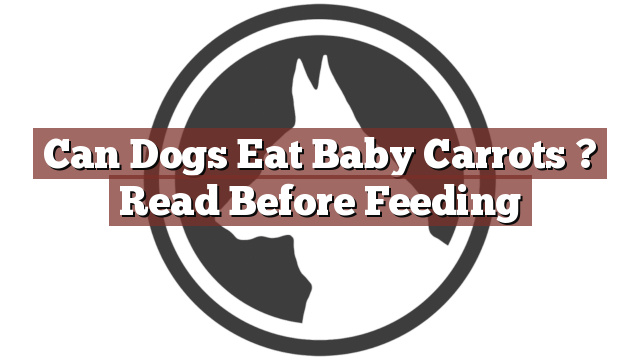Understanding Your Dog’s Dietary Needs
Proper nutrition plays a crucial role in ensuring the overall health and well-being of our furry friends. As responsible dog owners, it is essential to understand our canine companions’ dietary needs and provide them with a balanced and nutritious diet. While dogs are primarily carnivores, they can also benefit from incorporating certain fruits and vegetables into their meals. However, it is crucial to educate ourselves about which human foods are safe for our dogs to consume, as some can be harmful or even toxic to them.
Can Dogs Eat Baby Carrots? Read Before Feeding
Can dogs eat baby carrots? This is a common question among dog owners who are looking for healthy alternatives to treat their pets. The answer is yes, dogs can eat baby carrots. Baby carrots are not only low in calories but also a great source of vitamins, minerals, and fiber. These crunchy treats can be a healthy addition to your dog’s diet, promoting good digestion and dental health. However, as with any new food introduction, it is essential to proceed with caution and feed them in moderation.
Pros and Cons of Feeding Baby Carrots to Dogs
Feeding baby carrots to your dog has several benefits. Firstly, they are packed with essential nutrients such as vitamin A, vitamin K, and potassium, which can contribute to your dog’s overall health. Additionally, baby carrots are low in fat and cholesterol, making them an excellent choice for dogs on a weight management program or those prone to obesity. The high fiber content in baby carrots can also aid in regular bowel movements and prevent constipation.
However, it is crucial to be aware of the potential downsides of feeding baby carrots to dogs. While they are generally safe, some dogs may have difficulty digesting raw carrots. In such cases, it is advisable to cook the carrots before feeding them to your pet. Also, keep in mind that baby carrots should only be given as treats or a supplement to their regular diet, rather than replacing a well-balanced canine meal. Finally, always consult with your veterinarian before introducing any new food into your dog’s diet, especially if your pet has any underlying health conditions.
Conclusion
In conclusion, dogs can eat baby carrots and enjoy the numerous health benefits they offer. Baby carrots are a nutritious, low-calorie snack that can be a valuable addition to your dog’s diet. However, it is important to remember that moderation is key when feeding any new food to your pet. If you have any concerns or doubts about your dog’s dietary needs, it is always best to consult with your veterinarian, who can provide tailored advice based on your dog’s specific requirements. By understanding and meeting your dog’s nutritional needs, you can ensure that they lead a happy and healthy life by your side.
Thank you for taking the time to read through our exploration of [page_title]. As every dog lover knows, our furry friends have unique dietary needs and responses, often varying from one canine to another. This is why it's paramount to approach any changes in their diet with caution and knowledge.
Before introducing any new treats or making alterations to your dog's diet based on our insights, it's crucial to consult with a veterinarian about [page_title]. Their expertise ensures that the choices you make are well-suited to your particular pet's health and well-being.
Even seemingly harmless foods can sometimes lead to allergic reactions or digestive issues, which is why monitoring your dog after introducing any new food item is essential.
The content provided here on [page_title] is crafted with care, thorough research, and a genuine love for dogs. Nevertheless, it serves as a general guideline and should not be considered a substitute for professional veterinary advice.
Always prioritize the expert insights of your veterinarian, and remember that the health and happiness of your furry companion come first.
May your journey with your pet continue to be filled with joy, love, and safe culinary adventures. Happy reading, and even happier snacking for your canine friend!

